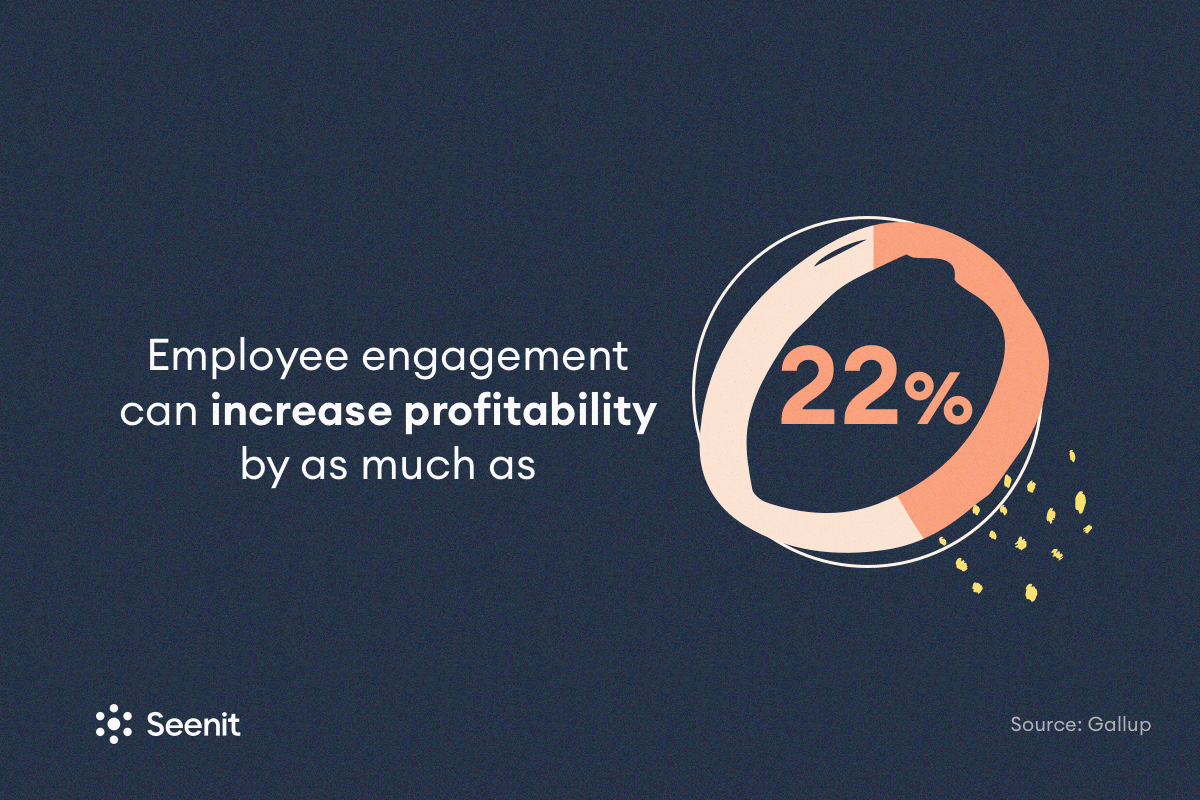The State of Employee Engagement 2023
20 min
We'll send you an email with a link to read the content later.





Employee engagement measures how employees feel about the company they work for and the strength of their bond with their work, team and organisation. An engaged workforce is important for the individual employee, their team and the business’s success. The reality is that employee engagement impacts crucial business metrics such as recruitment, retention, and productivity and can increase profitability by as much as 22%, according to employee engagement statistics.

But do you know how engaged your employees are and how they feel about their jobs and the company? You will only know if you ask, which is why employee engagement surveys are so important. They can help you discover what your staff think and feel, what drives them or holds them back and how you can help them fulfil their potential at work.
Employers use employee engagement surveys to measure how employees feel about the company and their level of engagement. These are usually questionnaires which can be delivered in different formats depending on the survey level. Through their feedback, employers can learn more about employee perceptions and experiences of the company, management team and organisational structure and identify trends.
By tracking their team’s engagement, companies can determine whether their workforce is happy, any challenges they face that could impede their work and how long they will likely stay with the company. Organisations can use the insights they gain to implement changes that improve employee engagement and business performance.
When developed and implemented with care, employee engagement surveys have a powerful and long-lasting impact on your business. Regularly evaluating employee engagement through feedback can position your business to make informed decisions about attracting, developing and retaining the best talent. Employee engagement surveys enable you to prioritise participation and well-being while helping you build a workplace where happy and satisfied employees feel supported and can reach their full potential. Employee engagement surveys can help your business:

The first step is to define the purpose of the survey and what you want to measure. Employee engagement is a broad topic, so start by thinking about exactly why you are surveying in the first place. For instance, you may want to dig deeper into issues raised in the previous check-in, or you may want to keep the survey open-ended without defining the topics. Remember that whatever questions you ask, you need to be prepared to address any issues arising from them, or you risk damaging employee engagement. Even without previous plans to address an issue, any insight surfacing in a survey should be addressed immediately.

An employee engagement survey aims to help you identify issues, solve problems and discover what you are doing right. To do this, you must ensure that the questions you ask deliver useful insights. The survey’s questions should ideally cover the following:

You don’t need to ask hundreds of questions to get interesting and valuable data. However, you do need enough questions to be able to get robust conclusions. Short and focused surveys typically have higher completion rates, meaning they deliver better-quality data. Also, the longer a survey is, the more opportunities employees have to get bored or lazy with their answers or even fail to complete the survey.

Allowing participants to provide their feedback anonymously is critical to the success of an employee engagement survey. Allowing employees to remain anonymous will encourage honesty and enable them to express their real opinions without fear of reprisal.

To help you gather as many survey responses as possible, invite everyone to respond. While email is typically the most common way to deliver the announcement, you could also consider including it in team meetings, physical notes around the workplace, using your team chat software or posting a notice about it on the firm’s intranet. It’s a good idea to use a few of these methods to ensure everyone hears about the survey, especially those who hot-desk or work remotely.

Explaining to employees the purpose of the survey and why you want their feedback will increase engagement and participation. People are typically more inclined to do something when they understand how it will benefit them, so make sure you explain that clearly from the outset. Some people will naturally be wary of giving their feedback and worry about potential reprisals. So with that in mind, make sure your announcements cover and explain what will happen to the feedback and that answers will be anonymous.

Once all the survey responses are in, it’s time to review and analyse the data to understand your company’s strengths and potential opportunities. Take time to identify those themes and trends employees feel positive about and any areas that employees highlight as requiring review or improvement.

The sooner you share the survey results, the better, as it shows everyone that you take their feedback seriously and that their contribution has a real purpose. It also reinforces trust in the survey process and will help to increase response rates next time. As you communicate the results, thank employees for taking the time to participate and sharing their honest feedback. Once you’ve reviewed the data, share the common themes and observations from the survey. Encourage managers to discuss the survey results with their teams to inspire further discussion and sharing of ideas.
Employee engagement surveys can reveal some surprising and uncomfortable truths. These need to be acknowledged and raised transparently with the wider company in order to find a solution that suits everyone. Addressing them will likely take time and may be difficult to accomplish, so allow sufficient time.

You must follow through with the survey’s findings and implement a targeted employee engagement strategy. Ideally, the findings of the survey will offer up some opportunities that you can begin working on addressing. For instance, if a lack of a career path at the company is a key theme, managers should look to identify and promote career development opportunities. Likewise, consider introducing an employee recognition programme if employees feel their contributions need to be acknowledged. But whatever action you take on the survey results, communicate this back to staff to show them that you are listening and that their feedback is valued.

Be ready to repeat the process and decide on cadence; at Seenit, we run our surveys quarterly. In the meantime, supplement your findings with other employee feedback channels during the year, such as performance reviews, an anonymous feedback box or a Q&A video.
We’ll deliver our latest content straight to your inbox
Key to an effective survey is asking the right engagement questions that touch upon employee satisfaction, job role, line management and teamwork. For example:
An employee engagement survey provides an effective channel for honest feedback and direct communication between employers and workers about where the company is doing well and needs improvement. Just as important is that an employee engagement survey also shows employees that they are active participants in the company’s development and future and that their voice matters.
Join some of the world's largest enterprises already using Seenit to create User-Generated Video.